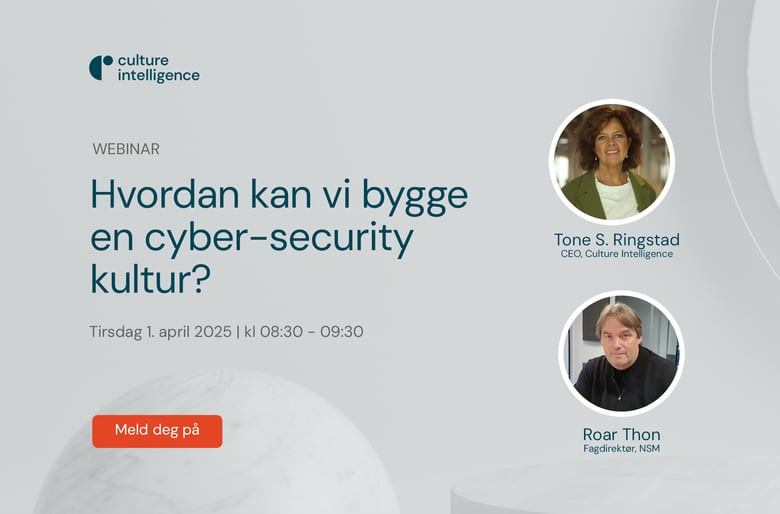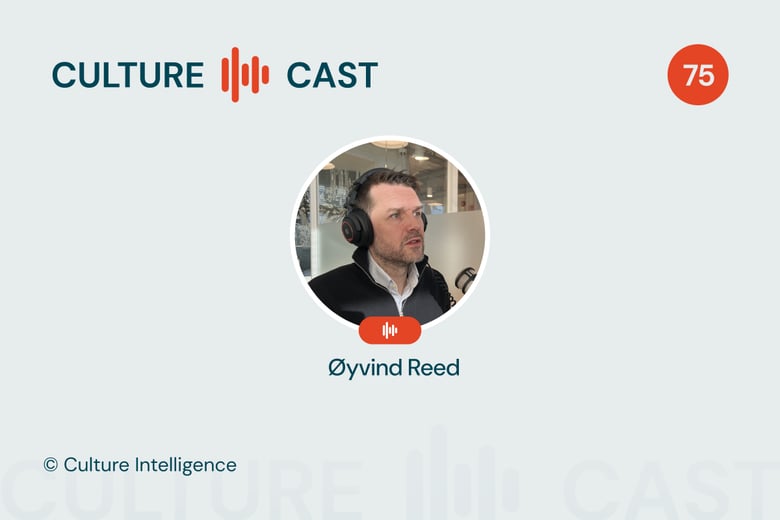It´s been suggested that companies now in US spend an average spend $2000 pr. Employee pr. year on culture initiatives (Gartner, 2017 Outlook Report). Despite the investment, only 30% of HR leaders think they have the culture they need. The huge gaps between the actual culture and the aspired culture in a company seem to have been identified, but yet not addressed. It´s like having a statement from a CFO, “there is a big gap in next year´s budget, but never mind, we hope it will be OK or fix itself.”
What is culture intelligence?
We define Culture intelligence as the capability to gather quality data, analyze and understand the actual culture and the impact it has on people and business, then design and clarify an aspired culture and having a strategy to engage and improve the organization to become that culture. The opposite is running on autopilot, leading by guts, making decisions on instincts and leaving it to the people to be what they want to be because they always have been.
Why don’t we build culture intelligence?
The reasons vary from business to business, but the main reasons have been identified. The culture does not get addressed, or aspired cultures are not designed mainly because people:
- Have no insight or understanding of how culture impact their business
- Have no insight in the differences between actual, aspired, communicated and customer´s perceived culture, believing they have the culture communicated on their website
- Lack insight and self-awareness about their own values and how they impact the culture. They basically run on autopilot, with less than 30% consciousness about why culture matters, hence believe they are living the aspired culture
- Lack awareness of what the aspired culture in their company is and what it means to them, their actions and to the business
- Don’t believe in or support the aspired culture, either because they have not been part of creating it or don’t believe it is possible or effective
- Don’t know how to put the aspired culture into action, either because they will be the first or the risk of failure is too big or because they don’t know how to do it
Root causes preventing culture development
- There is a lack of scientific data
- There is a lack of evidence based framework to identify and analyze culture. The company may have little or unstructured data on what their culture actually is
- There are possibly subcultures that may confuse the overall culture overview, and these subcultures may represent severe culture gaps that need to be eliminated
- The Culture Strategy and Assessments are “important, but not urgent” . Culture initiatives, then, in times of tough priorities, do not stand in competition with budget process, customer initiatives or financial reporting.
- Culture is not promoted by the board of directors.
Kill the autopilot
We need to kill the autopilot in the game. Becoming aware of who we are and what impact we personally have on business is key. It starts with the awareness in leaders, and leaders must create insight. But it is everyone´s responsibility to get out of their autopilot and see that they cannot run decision making and teamwork on intuition, hopes and gut feeling any longer. We need an organization that understand why they are there, and collectively develop a conscious way of operation and development that aligns to the brand, strategy and purpose.
Building culture intelligence
In order to get a clear picture of where to start, you need culture data and insight. Only 10% of HR leaders are confident they have this, mostly because the data are insufficient, outdated or easy to mis-interpret (Gartner, 2017). Annual Culture Assessments will bring data and a shared understanding about what is true or not about your culture here and now. It will over time allow you to see the shifts from last year and build continuity in how culture is understood, transformed and impacted business from last year. The actual culture is discussed, challenged and owned, and generate engagement and ownership in the entire organization.
The aspired culture is derived from the business purpose, strategy, people engagement and society. It is the most complex, but meaningful strategic process in an organisation. The aspired culture is carefully designed and put into communication and branding. It will also be integrated in all the business management processes like people development, bonus and salary, talent attraction and retainment, onboarding and leadership promotions.
The culture gaps between actual and aspired will be subject to analyses and action generation. It starts with the executives. If they don’t move, nothing will happen. Each of them must also look at data for their team and identify their gaps.
Each person in the organisation should also be getting their personal gap identified. Responsibility to develop each person´s personal part of building the aspired culture must be on the leadership agenda, to be addressed in the development dialogues and career development.
Team transformation is hard, takes time and money and can be perceived as a great personal risk. There are boundaries in the organization that may be be great barriers, like leadership disagreements, competing subcultures, expensive lack of communication and ineffective team performance. All to be addressed in finding new ways through the aspired culture.
Does Culture Intelligence take time and resources? Definitely! Is it really necessary? Depends on your business ambitions. But if you do have a plan to be a sustainable business over time, chances are that being intelligent about your culture will be an effective and profitable way to get you fit for your business purpose and strategy.



